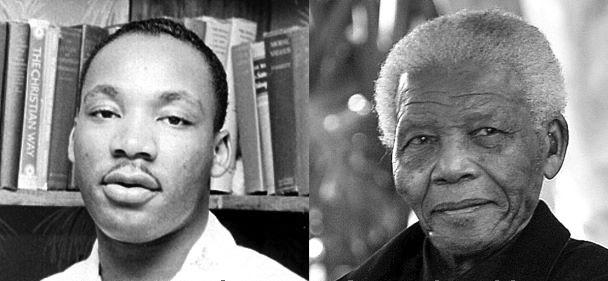This past December, the world lost an irreplaceable inspiration, leader and friend-Nelson Mandela.
On Jan. 20, as is customary every January, schools and businesses across the country enjoyed a day of rest to honor the late Martin Luther King, Jr.’s birthday. On Jan. 22, the HUB at Sonoma State hosted a discussion on these two brave men and their groundbreaking contributions to the development of the civil rights movements.
The discussion included outside guests, as well as a class of Hutchins’ students and members of the HUB’s staff.
The contributors gathered for an introductory exchange, then broke off into smaller sections to discuss the information presented to them about the two leaders.
They then reconvened to open the discussion to the entire group. The talk covered a wide range of aspects of the men, including Dr. King’s “Triple Evils” theory and the differences in the dignitaries’ speech-delivery.
The energy in the room was unmistakable; the topic was full of passion and intensity, it was clear that this discussion was no ordinary lecture.
“What can we learn from these people, how can we learn how to act? Their inspiration acts as a backbone,” said Jason Smith, a senior communications major.
Different contributors brought their own views and insight to the table, resulting in a colorful, exuberant exchange.
They discussed how the peaceful approach used by Mandela contrasts the modern-day tendency that leans heavily towards violent rebuttals and war, which led into a questioning of what it means “to love.”
An idea of real-life application was at the underlying forefront of the discussion; the attendees were encouraged to take away a new sense of radicalization and to make little, positive changes in the world around them.
Doing simple tasks to help out their fellow man was encouraged and the point was stressed that large-scale advancement begins on a smaller scale.
Both men served as heads of different civil rights movements; Mandela in South Africa and Dr. King in the United States.
They shared similarities in their stance on peaceful protests, civil rights and equality.
Both are recognized for their ability to maintain a peaceful front in the face of physical violence; the contributors brought up the reasoning that peaceful movements are so successful because it’s hard to fight someone who won’t fight back.
Not every subtopic was as positive; the group also discussed how Dr. King applied for a gun for protection after a threat was made to his family and how he was denied because of the color of his skin.
The HUB, located on the second story of the student center, holds discussions like this several times a month.
They are open to anyone who is interested in the topic, which changes with every meeting.
Mark Fabionar, the director of the HUB, said that the main objective of the organization is to offer students and faculty a place to openly discuss diversity and social justice issues.
They also hold workshops and lectures on a wide range of topics and student organizations use the space to meet and plan.
The discussion and interaction with other minds helps clarify such issues.
“[It was good to hear] others’ thoughts on how to move in a better direction, and apply it to current-day situations,” said grad student Kelly Hodgins.
Anyone who is interested in attending a discussion at the HUB is encouraged to check out their information site, Facebook.com/sonoma.thehub



































